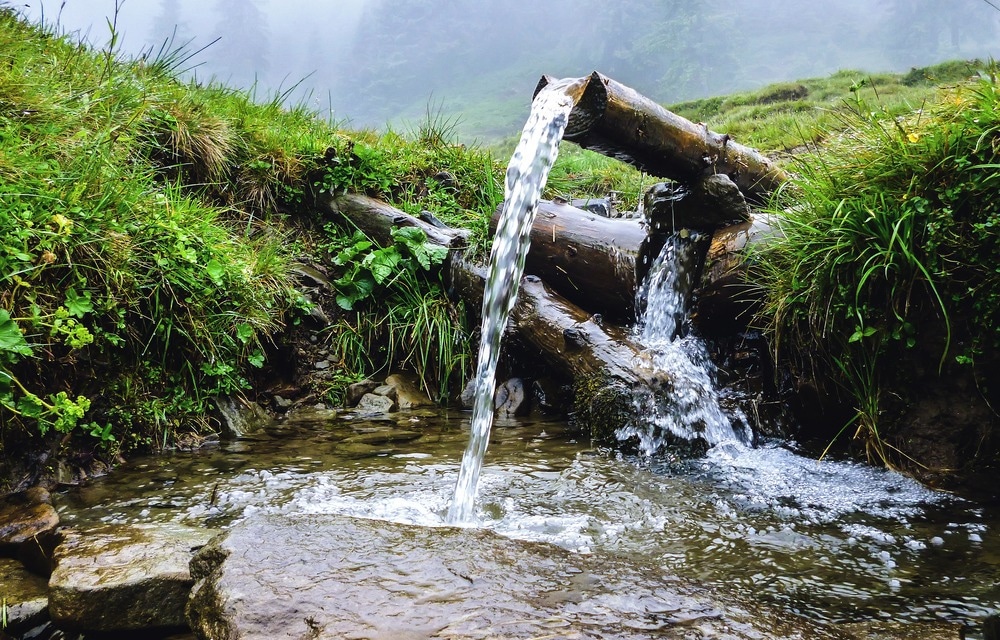When we think of water, many of us think of the world’s oceans, seas, lakes, and rivers, but most of the Earth’s freshwater is groundwater, which supplies most of the water we drink. Groundwater is water that has traveled beneath the soil surfaces within the sediment of the ground occupying all empty spaces it finds between the surface and impenetrable rock.

Image Credit: Farion_O/Shutterstock.com
Groundwater can leave this space, known as the saturated zone, through springs, lakes, rivers, streams, and manmade wells. It is replenished by rainfall, melting snow, water seeping, and irrigation. Once in the ground, groundwater can move to the surface again in a matter of days or weeks; it can also remain in the ground for years, even tens of thousands of years at a time.
Why is it Important to Our Planet?
Groundwater is essential for life on Earth. It is estimated that 98% of the world’s available freshwater is provided as groundwater. The total freshwater available as groundwater surpasses our reserves of freshwater in lakes and streams by 60-fold.
In the US, groundwater provides roughly half of all drinking water for human consumption. For rural populations, this is as much as 100%. It is also an essential domestic, commercial, and industrial water source.
The world relies heavily on groundwater, although it is not often obvious how precious resource groundwater is. Without groundwater, we would lose an essential source of drinking water and water for vital activities, such as washing, bathing, and cooking.
What is the Current State of Groundwater and How Has Technology Helped Study It?
Worldwide, groundwater supports public health, the environment, and the economy. However, its importance is often overlooked. It is vital that humans do not remove too much groundwater too quickly without allowing it time to replenish. This can be done all too easily by pumping it from the earth. The latest data, unfortunately, has warned that much of the Earth’s groundwater is drying up. NASA recently reported that 21 out of the world’s 37 biggest aquifers (rock or sediment holding groundwater) have lost groundwater.
Recent data collected via satellite and analyzed at the Institute of Geodesy at TU Graz found that Europe severely needs groundwater. It was already understood that the continent had suffered a drought since 2018. Data has confirmed that groundwater levels have been consistently low since this year despite extreme weather such as flooding.
The data was collected and analyzed by a team of scientists at the Institute of Geodesy at the Graz University of Technology as part of the EU’s Global Gravity-based Groundwater Product (G3P) project. The team used cutting-edge technology that leverages data from two satellites named Tom and Jerry, which orbit the Earth at a distance of around 200 km apart and a polar orbit of 490 km in altitude.
The distance between the two satellites is vital to understanding changes in groundwater. This is because land mass increases the speed of the preceding satellite, with the following satellite lagging. These changes in distance between the satellites over large land masses are used to determine precise changes in the Earth’s gravitational fields.
The pair of satellites orbit the planet roughly 15 times daily, collecting measurements every five seconds and producing around half a million monthly measurements. This wealth of data is then used to generate gravity field maps. On their own, gravity field maps cannot tell us about volumes of groundwater as the land masses they detect must first be distinguished from rivers, lakes, and seas.
Cooperation with experts in these fields helped the team at TU determine the changing level of groundwater in Europe over several years by subtracting mass changes in bodies of water to estimate the remaining groundwater.
Europe is Losing Groundwater; What Will the Consequences Be?
The effects of losing groundwater impact people, animals, and the planet. The loss of groundwater in Europe is associated with the loss of aquatic habitats, the dry soils that cause numerous serious problems for agriculture, and the lack of water needed for energy generation, such as the cooling water needed for nuclear power plants and the water source needed to power hydroelectric power plants.
In other parts of the world, such as the US, where a significant portion of the population relies on water from wells, a loss of groundwater can very quickly translate to extended droughts where drinking water resources are jeopardized for entire communities.
In parts of California, this has already happened. Recently, the people of East Porterville suffered extended droughts where deeper wells had to be drilled, leading to a further decrease in groundwater levels.
It is of urgent importance that initiatives are established to protect the world’s groundwater. If more attention is not given to groundwater, levels may continue to fall, which will have catastrophic effects on the planet and those living on it.
References and Further Reading
Alice Clifford. 2023. Europe on the verge of water catastrophe as groundwater reserves dry up, scientists warn [online]. The Independent. Available at: https://www.independent.co.uk/climate-change/news/water-drought-climate-change-b2271366.html (Accessed March 2023)
Europe Lacks Groundwater: Satellite Data Shows Sustained Severe Drought Across the Continent [online]. SciTechDaily. Available at: https://scitechdaily.com/europe-lacks-groundwater-satellite-data-shows-sustained-severe-drought-across-the-continent/?utm_content=cmp-true (Accessed March 2023)
Information on Earth’s Water [online]. National Groundwater Association. Available at: https://www.ngwa.org/what-is-groundwater/About-groundwater/information-on-earths-water (Accessed March 2023)
Robinson Meyer. 2015. The Earth's Evaporating Aquifers [online]. The Atlantic. Available at: https://www.theatlantic.com/technology/archive/2015/06/earth-running-out-water-aquifiers/396152/ (Accessed March 2023)
Disclaimer: The views expressed here are those of the author expressed in their private capacity and do not necessarily represent the views of AZoM.com Limited T/A AZoNetwork the owner and operator of this website. This disclaimer forms part of the Terms and conditions of use of this website.